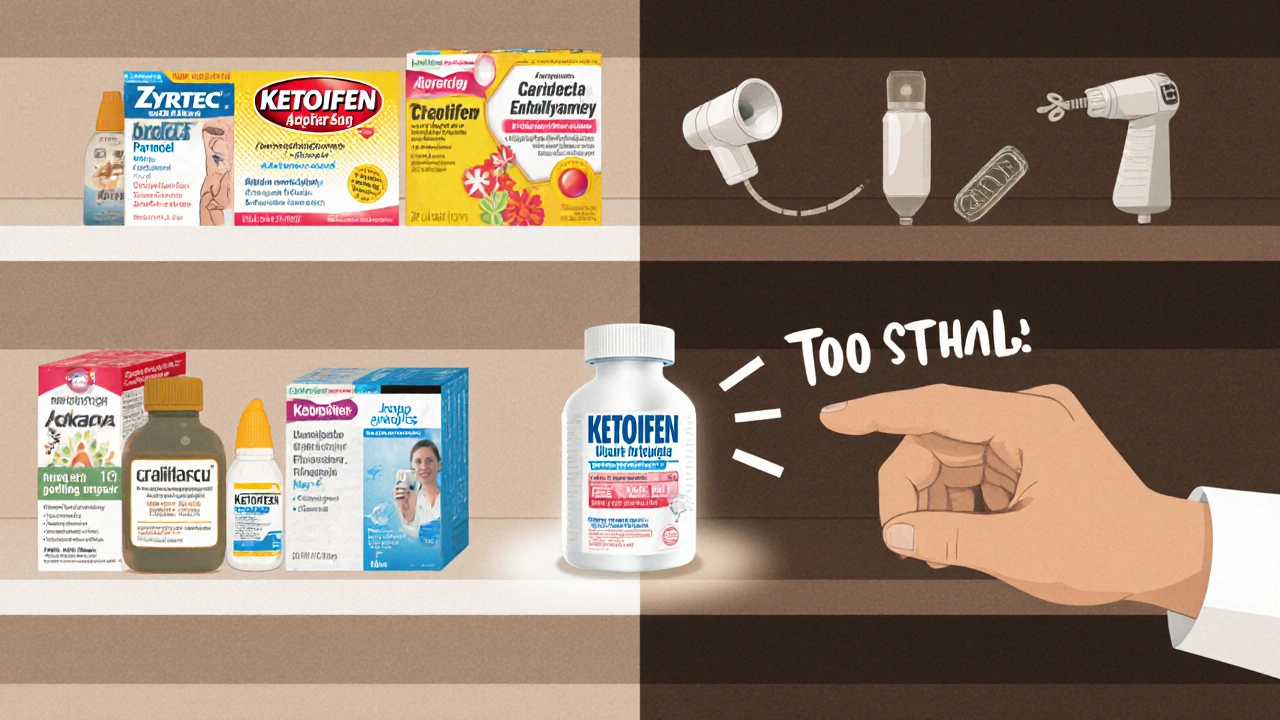Ketotifen isn’t a household name like antihistamines such as cetirizine or loratadine, but for people with chronic allergies or mild asthma, it’s been a quiet lifeline for decades. Originally developed in the 1970s and still used in parts of Europe and Asia, Ketotifen works differently than most over-the-counter allergy pills. It doesn’t just block histamine-it also stabilizes mast cells, stopping them from releasing the chemicals that trigger itching, swelling, and wheezing. That dual action makes it unique. But it’s not the only option. If you’re considering Ketotifen, you’re probably weighing it against other treatments. So how does it stack up?
How Ketotifen Actually Works
Ketotifen is classified as a mast cell stabilizer and a second-generation H1 antihistamine. Most antihistamines like Claritin or Zyrtec only block histamine receptors after the chemical is already released. Ketotifen stops the process before it starts. It prevents mast cells-immune cells packed with histamine and other inflammatory triggers-from degranulating. That means less sneezing, less runny nose, and fewer asthma flare-ups triggered by allergens like pollen, dust mites, or pet dander.
It’s taken orally, usually once or twice daily. The standard adult dose is 1 mg per day, split into two doses. It can take up to two weeks to build up its full effect, which is slower than fast-acting antihistamines. But once it kicks in, many users report sustained relief without the drowsiness common with older antihistamines like diphenhydramine.
It’s approved for use in children as young as three months in some countries, making it one of the few options for long-term allergy control in young kids. In the UK, it’s available by prescription only under the brand name Zaditen. In the U.S., it’s not FDA-approved for oral use, though eye drops containing Ketotifen are widely available.
Alternative 1: Cetirizine (Zyrtec)
Cetirizine is one of the most common antihistamines worldwide. It’s available over-the-counter in most countries, including the UK and U.S. It starts working within an hour and lasts up to 24 hours. For most people with seasonal allergies, it’s a reliable first-line choice.
Compared to Ketotifen, cetirizine is faster and easier to access. But it doesn’t stabilize mast cells. That means if your symptoms are driven by more than just histamine-like inflammation from eosinophils or leukotrienes-cetirizine might not be enough. Studies show Ketotifen reduces nasal eosinophil counts more effectively than cetirizine in allergic rhinitis patients.
Drowsiness is a known side effect of cetirizine in about 10-15% of users, especially at higher doses. Ketotifen causes drowsiness too, but less consistently. Some users report no sleepiness at all, while others find it sedating enough to take at night.
Alternative 2: Montelukast (Singulair)
Montelukast targets leukotrienes, another group of inflammatory chemicals involved in asthma and allergic reactions. It’s commonly prescribed for asthma control, especially in children, and for allergic rhinitis when antihistamines aren’t enough.
Unlike Ketotifen, Montelukast doesn’t touch histamine. That makes it a good complement-not a replacement. In fact, some doctors combine Montelukast with Ketotifen for patients with persistent asthma and allergic rhinitis. One 2020 study in the Journal of Asthma found that patients on both drugs had fewer nighttime symptoms and used less rescue inhalers than those on either drug alone.
Montelukast is taken once daily, usually in the evening. Its main downside is the potential for neuropsychiatric side effects, including mood changes, nightmares, and in rare cases, depression or suicidal thoughts. The FDA added a black box warning in 2020. Ketotifen has no such warning.
Alternative 3: Loratadine (Claritin)
Loratadine is another popular over-the-counter antihistamine. It’s non-sedating for most people and lasts 24 hours. It’s often the go-to for mild, intermittent allergies.
But here’s the catch: loratadine only blocks histamine. If your allergies involve nasal congestion, eye swelling, or asthma-like symptoms, you might need more. Ketotifen’s mast cell stabilization helps reduce nasal congestion better than loratadine in clinical trials. One randomized trial in 2018 showed Ketotifen reduced nasal blockage by 42% over four weeks, compared to 28% with loratadine.
Loratadine is cheaper and easier to get. Ketotifen requires a prescription and costs more-around £25 for a 30-day supply in the UK. But if you’ve tried multiple antihistamines and still struggle with symptoms, Ketotifen might be the missing piece.

Alternative 4: Cromolyn Sodium (Nasalcrom)
Cromolyn sodium is another mast cell stabilizer, but it’s only available as a nasal spray or inhaler. It’s used preventatively-taken before exposure to allergens. It doesn’t relieve symptoms once they’ve started.
Ketotifen, by contrast, works both as a preventive and a treatment. You can take it daily, even if you’re not feeling sick, and it still helps reduce overall inflammation. Cromolyn needs to be used four times a day, which many people find impractical. Ketotifen is once or twice daily, oral, and doesn’t require precise timing around allergen exposure.
Both are safe for long-term use, including in children. But Ketotifen’s oral form gives it a big advantage in compliance and convenience.
Alternative 5: Omalizumab (Xolair)
Omalizumab is a biologic injection for severe allergic asthma. It’s expensive-over £1,000 per month in the UK-and reserved for people who don’t respond to standard treatments. It targets IgE antibodies, the root trigger of allergic reactions.
Ketotifen is nowhere near as powerful. But for mild to moderate cases, it’s a far more practical option. Omalizumab is for when everything else has failed. Ketotifen is for when standard antihistamines aren’t cutting it-but you’re not ready for biologics or steroids.
There’s no direct comparison study between Ketotifen and Omalizumab because they’re used in completely different patient groups. But if you’re looking for a step between antihistamines and biologics, Ketotifen fits squarely in that gap.
Who Should Consider Ketotifen?
Ketotifen isn’t for everyone. But it shines in specific cases:
- You have chronic allergic rhinitis and asthma that doesn’t fully respond to antihistamines alone
- You’re a parent looking for a long-term, non-steroid option for a child with allergies
- You’ve tried cetirizine, loratadine, or montelukast and still have symptoms
- You want to avoid daily nasal sprays or injections
- You’re sensitive to the mood-related side effects of montelukast
It’s not ideal if you need fast relief for sudden symptoms. Don’t take it as a rescue medication. It’s a preventive, long-term tool.

Side Effects and Safety
The most common side effect of Ketotifen is drowsiness-reported in about 15-20% of users. That’s similar to cetirizine. Some people find it so sedating they take it at night. Others barely notice it.
Other possible side effects include dry mouth, increased appetite, and weight gain. In rare cases, it can cause headaches or irritability. Unlike montelukast, it doesn’t carry psychiatric warnings. It’s not known to interact with most medications, making it safe for people on multiple prescriptions.
It’s not recommended during pregnancy unless benefits clearly outweigh risks. Always check with your doctor if you’re pregnant or breastfeeding.
Where to Get It
In the UK, Ketotifen (Zaditen) is available by prescription only. Your GP can prescribe it off-label for allergies or asthma if they think it’s appropriate. It’s not on the NHS formulary for all indications, so you might pay the full pharmacy price.
In the U.S., oral Ketotifen is not FDA-approved. You can’t buy it legally without a special import permit or through compounding pharmacies-which may not be covered by insurance. Some people order it from overseas pharmacies, but that carries legal and safety risks.
Eye drops containing Ketotifen (like Zaditor) are available over-the-counter in the U.S. and can help with allergic conjunctivitis, but they won’t help with nasal or lung symptoms.
Final Thoughts: Is Ketotifen Right for You?
If you’ve been stuck with allergies or mild asthma that won’t quit, and standard meds haven’t helped, Ketotifen deserves a look. It’s not flashy, but it works where others fall short. Its dual action-blocking histamine and calming mast cells-gives it an edge over single-target drugs.
It’s not the fastest, not the cheapest, and not the most widely known. But for the right person, it’s one of the most effective long-term options available. Talk to your doctor about trying it if you’ve hit a wall with other treatments. Keep a symptom diary for two weeks before and after starting-it helps track whether it’s making a real difference.
There’s no one-size-fits-all allergy treatment. But Ketotifen fills a real gap in the options list-and for many, it’s the answer they didn’t know they were looking for.
Is Ketotifen better than Zyrtec for allergies?
Ketotifen and Zyrtec (cetirizine) both treat allergies, but they work differently. Zyrtec blocks histamine quickly and is good for immediate relief. Ketotifen also blocks histamine but goes further by stabilizing mast cells, which can reduce inflammation over time. For people with persistent symptoms, especially those with asthma or chronic nasal congestion, Ketotifen often provides more complete control. However, Zyrtec works faster and is easier to get without a prescription.
Can I take Ketotifen with other allergy meds?
Yes, Ketotifen is often combined with other allergy medications. Many doctors prescribe it alongside montelukast for asthma and allergic rhinitis, or with nasal corticosteroids for severe congestion. It can also be used with antihistamines like cetirizine if symptoms aren’t fully controlled. But always check with your doctor before mixing medications to avoid unnecessary side effects.
Does Ketotifen cause weight gain?
Weight gain is a possible side effect of Ketotifen, reported in up to 10% of users. It’s linked to increased appetite, not fluid retention. If you notice sudden weight gain after starting Ketotifen, talk to your doctor. Adjusting the dose or switching timing (e.g., taking it at night) may help. This side effect is less common than with steroid-based treatments.
Is Ketotifen safe for children?
Yes, Ketotifen is approved for children as young as three months in countries where it’s prescribed. It’s often used for chronic allergic conditions like eczema, allergic rhinitis, and mild asthma in kids. Dosing is based on weight and age. Parents should monitor for drowsiness and increased appetite. It’s considered safer long-term than inhaled corticosteroids for some children.
Why isn’t Ketotifen available in the U.S.?
The FDA never approved oral Ketotifen for allergies or asthma, despite its use elsewhere for over 40 years. The reasons aren’t fully public, but likely involve regulatory priorities and lack of commercial interest from U.S. pharmaceutical companies. Eye drops with Ketotifen are available because they treat a specific condition (allergic conjunctivitis) and have a clear safety profile. Oral use remains off-label and hard to access legally in the U.S.
If you’re struggling with allergies that won’t go away, don’t assume you’ve tried everything. Ketotifen might be the quiet solution you haven’t heard about-but it’s been helping people for decades. Talk to your doctor, track your symptoms, and give it a fair chance.

Bryan Heathcote
October 28, 2025 AT 05:05I've been on Ketotifen for 8 months now for my chronic allergic asthma, and honestly? It's the only thing that's kept me off the inhaler. Zyrtec used to work, but now I'm just constantly congested. Ketotifen doesn't give me that zombie feeling like Benadryl, and I don't have to time my doses around pollen counts. It's slow, yeah, but it's steady. I take it at night and wake up breathing like a normal human.
Snehal Ranjan
October 28, 2025 AT 14:01As a physician from India where Ketotifen is commonly prescribed for pediatric allergic conditions I must say this article is remarkably accurate and well researched The mast cell stabilization mechanism is indeed the key differentiator from standard antihistamines Many parents here rely on it for their children with persistent eczema and seasonal rhinitis without resorting to steroids I have seen remarkable improvement in quality of life for families who were previously dependent on daily nasal sprays and emergency inhalers
Sabrina Aida
October 28, 2025 AT 20:17So let me get this straight. We're celebrating a drug that's banned in the U.S. because Big Pharma didn't find it profitable enough? How poetic. We live in a world where the only medicine that matters is the one that can be patented and priced at $200 a pill. Ketotifen works? Great. But it doesn't have a shareholder meeting. So it's invisible. We don't need better drugs-we need a system that doesn't equate value with profit margin. The real allergy is capitalism.
Alanah Marie Cam
October 28, 2025 AT 20:44Thank you for sharing such a thoughtful and clinically grounded overview. For anyone struggling with persistent symptoms despite standard treatments, this is exactly the kind of information that should be more widely known. Ketotifen is not a magic bullet, but for the right patient, it can be transformative. I encourage anyone considering it to keep a detailed symptom diary and to work closely with a knowledgeable provider. Your body deserves a treatment plan tailored to its unique needs, not just the most convenient option.
Patrick Hogan
October 29, 2025 AT 02:17So you're telling me the FDA banned this because it's too effective and too cheap? Brilliant. I'm sure the board meeting where they decided not to approve it was a real tearjerker. 'Gentlemen, if we approve this, we'll have to fire half the sales team.' Classic. I'll take my 25 quid/month import from Germany over your $12 OTC antihistamine any day.
prajesh kumar
October 30, 2025 AT 01:50I am a parent of a 5 year old with severe seasonal allergies and this post gave me hope My child was on Zyrtec but still had nighttime coughing and red itchy eyes Then we tried Ketotifen after a referral from our pediatric allergist in Mumbai and within two weeks the difference was night and day No more sleepless nights no more constant rubbing of eyes and no more missed school days I know it is hard to get in the US but please if you are struggling do not give up there are options out there
Arpit Sinojia
October 30, 2025 AT 23:24Been using Ketotifen for 3 years now. Took it after montelukast gave me nightmares that felt like I was being chased by a sentient asthma attack. Ketotifen? Chill. Doesn't make me feel like I'm living inside a horror movie. Just a quiet, steady relief. I take it at night, wake up not wheezing, no drowsiness the next day. It's not glamorous but it's reliable. Like that one friend who never shows up late but always shows up.
Kshitiz Dhakal
October 31, 2025 AT 04:47How ironic that the most holistic solution-mast cell stabilization-is the one the West rejects. We chase molecules like gods while ignoring the body's innate wisdom. Ketotifen doesn't just block-it harmonizes. The FDA doesn't understand balance. They understand profit. And so do we, in our quiet desperation. 🤷♂️
Mer Amour
October 31, 2025 AT 11:19Let’s be clear: anyone taking Ketotifen without a prescription is playing Russian roulette with their liver. The FDA doesn’t approve drugs on a whim. If it’s not approved, there’s a reason-unstudied interactions, unknown long-term effects, inconsistent manufacturing. Don’t romanticize unregulated imports. You’re not a rebel, you’re a liability.
Shanice Alethia
October 31, 2025 AT 16:34Oh wow, another one of those 'magic bullet' posts. Did you even read the side effects? Weight gain? Drowsiness? And you're recommending it as a 'quiet lifeline'? Please. If you're still struggling after Zyrtec and Claritin, maybe your allergies aren't the problem-maybe your lifestyle is. Eat less sugar. Sleep more. Stop hugging your cat. Ketotifen is just another band-aid for people who refuse to fix the root cause.
Sam Tyler
October 31, 2025 AT 20:16For those considering Ketotifen, I want to emphasize the importance of a trial period. Because its effects build gradually, many patients give up too soon. I’ve had patients discontinue after 5 days because they didn’t feel immediate relief-only to come back months later after their symptoms worsened. A minimum of 14 days is needed to assess efficacy. Also, pairing it with a nasal saline rinse can enhance outcomes significantly. This isn’t a replacement for allergen avoidance-it’s a complement. And yes, it’s worth the effort if your quality of life is compromised.
William Cuthbertson
November 2, 2025 AT 19:46Having lived in both the UK and the US, I can say the difference in access to Ketotifen reflects something deeper about our relationship with medicine. In Britain, we accept that sometimes the best tools aren’t the flashiest or the newest-they’re the quiet, reliable ones. In America, we demand novelty, branding, and speed. Ketotifen doesn’t have a TikTok campaign. It doesn’t have a celebrity endorsement. But for decades, it’s been helping people breathe without screaming for attention. Maybe we need to stop treating medicine like a product and start treating it like a practice.
Eben Neppie
November 3, 2025 AT 13:19For anyone thinking of importing Ketotifen from overseas: DON’T. The FDA has warnings for a reason. Counterfeit pills are rampant. I’ve seen cases where what was labeled Ketotifen was actually a mix of antihistamines and unregulated stimulants. If you’re desperate, go through a compounding pharmacy with a valid prescription. Otherwise, you’re gambling with your health. And if you think I’m being alarmist, talk to the ER doctor who had to treat the guy who took 'Ketotifen' from a shady site and ended up with toxic hepatitis.
Hudson Owen
November 4, 2025 AT 13:53Thank you for writing this. I’ve been a nurse for 18 years and I’ve seen too many patients dismissed because their symptoms don’t fit the textbook. Ketotifen isn’t glamorous, but it’s real. I’ve had mothers cry in my office because their child finally slept through the night after starting it. And yes, it’s harder to get in the U.S.-but that’s a failure of our system, not the drug. If you’re reading this and you’re struggling, please don’t feel like you’re broken. You’re just one overlooked option away from relief.